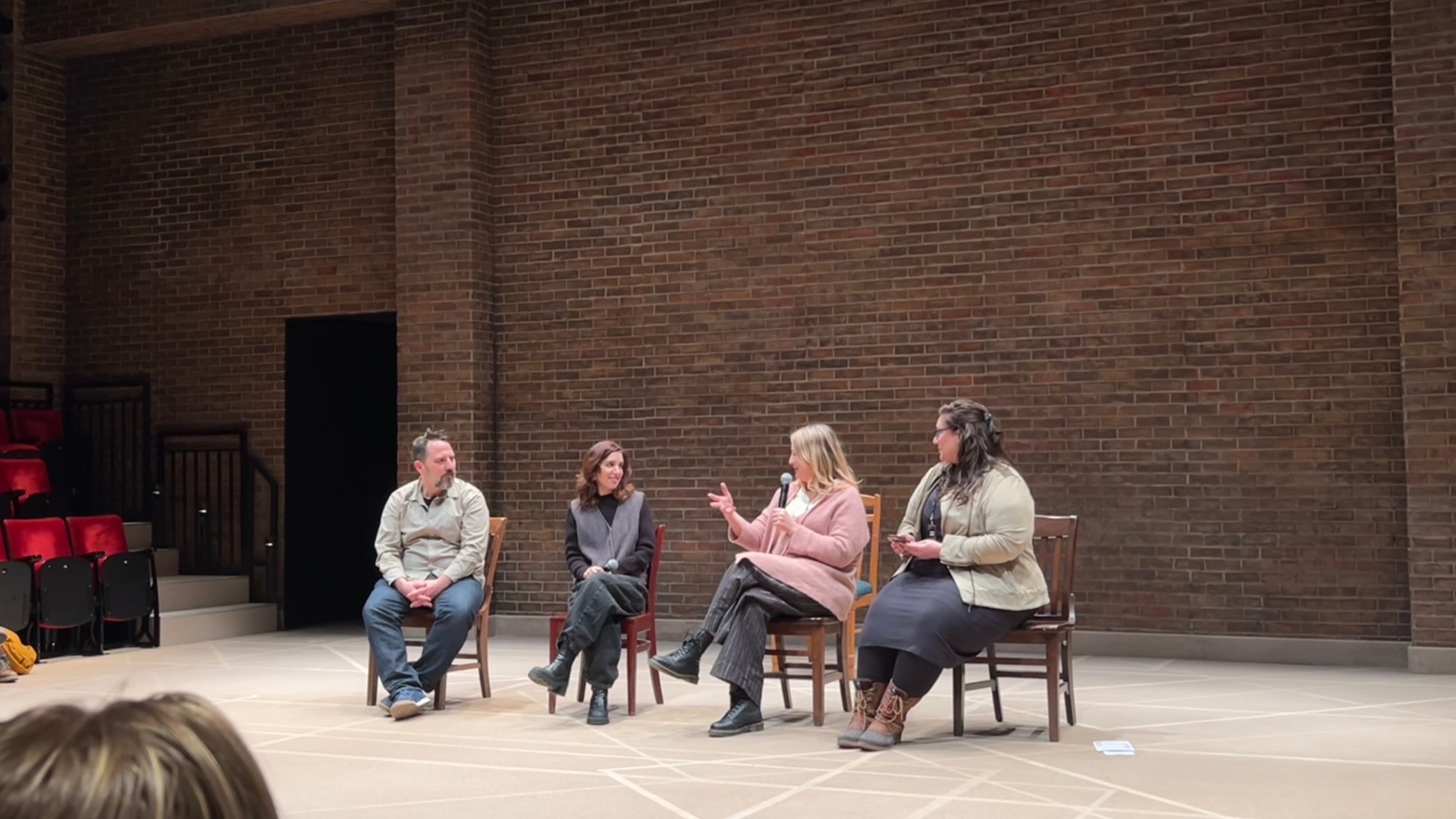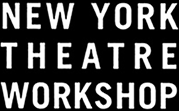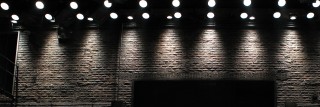

Despite the cold weather outside the walls of the Workshop, the room feels warm as I watch Khawla Ibraheem’s performance of A Knock on the Roof. I can feel how the audience around me is moved by Khawla’s performance as Mariam, a mother rehearsing how she and her family can run from the titular evacuation warning. Collectively, we consider the questions she asks of us (or individually, answer aloud when asked directly). Parents in the audience laugh at Mariam’s complaints about her family. All of us feel the weight she carries throughout her story.
Following the performance, Khawla returns to the stage for an AfterWords talkback with Heidi Schreck and Oliver Butler, director of both A Knock on the Roof and Heidi’s play, What the Constitution Means to Me, which NYTW produced in 2018. Over the course of the talkback, the parallels between two pieces of solo performance quickly emerge (beyond their mutual director, and their Workshop premieres coincidentally falling post-election).
“Both of your pieces and the way you performed them are full of wit,” says Knock Assistant Director Zeina Salame, who is moderating the conversation. “Could you talk about the importance of humor to solo, or solo-ish, performance?” (Her qualifier here references how Constitution technically features two other people.)
“Humor, in general, is such a great tool,” Khawla responds. “Laughter is a natural reaction, truly a way to connect and react together. We shared this moment. You didn’t need to go through a war to connect with Mariam.”
“I agree,” Heidi responded plainly, prompting both of them to laugh together. “You said it so beautifully. But I will also add that I just don’t know how to tell a story any other way.”
Humor and its counterpoint with heaviness is one of the many tensions audiences may find in a new piece at the Workshop, particularly within one of its multidimensional solo performances. It would be nearly impossible to capture the full history of how NYTW has uplifted solo performance since its founding in 1979. For example, the “O Solo Mío” Festival ran from 1988 to 1994, and featured artists like Lisa Kron, Muriel Miguel of Spiderwoman Theater, Jonathan Larson (with his reprise of tick, tick… BOOM!), and many more. Many playwright-performers have premiered a solo performance here, like the high-energy Kristina Wong, Sweatshop Overlord (2021), or have premiered several, like in the case of Dael Orlandersmith with her plays Monster (1996), The Gimmick (1999), and Forever (2015). Even at the time of writing this, as part of the Under the Radar Festival, NYTW has another solo performance, The 7th Voyage of Egon Tichy [redux], onstage in our 4th Street Theatre.
Khawla joins this long line of powerful solo performers to perform their own writing onstage at the Workshop. In college, I studied the effects solo performers have on audiences, and what their enduring performances leave us feeling. I have specifically been fascinated by how witnessing the labor of a solo performance helps connect us to the themes of the play. Khawla’s endurance onstage, for example, is seen through her dynamic effort put into each of Mariam’s time trials, or her character-switching between Mariam and various members of her family. We could argue her energetic performance parallels the manyness and heaviness of the burdens she carries.
Likewise, as the only voice onstage for most of Constitution, Heidi runs back and forth from her podium at the center of the stage, telling stories of her life in connection to the U.S. Constitution. Like Khawla, Heidi’s determined, laborious performance maps onto the exhaustion she expresses over the many wrongs enacted upon women and marginalized communities. During the AfterWords conversation, Heidi also tells us solo performance and its use of audience interaction take on an important political meaning for her piece. “I felt like the underlying reason for audience interaction was to model participatory democracy,” she says. Constitution’s form as a play embodies what it argues. Both Heidi and Khawla invite audience voices into the space, and in a way, we are invited to join these women in their stories and to carry some weight of the performance with them.
In fact, during the talkback, Heidi and Khawla even discuss the labor of solo performance on and off the stage. “How do you keep the show alive even though you’re sick of your own voice?” Khawla asks herself. “I just don’t talk to anyone outside of the show—I text! I don’t even do audio messages,” she says, echoed by laughter from the room. “I have to be here for these 85 minutes and be specific and alive.”
“What makes theatre a spiritual experience is that it is a ritual you perform everyday. You show up and keep doing your best,” Heidi adds. She and Khawla chat a bit more about the importance of vocal coaches and pre- and post-show rituals, which are essential to enduring a long run of a show and being able to create the meaningful impact we feel in the audience.
NYTW aims to produce the work of visionary theatremakers, who seek to leave us with questions rather than answers, illuminate our shared human experiences, and show us the tension between opposing forces. It certainly does so through moving solo pieces, like Khawla’s, with energetic performances that are both enduring onstage and enduring in our hearts and minds long after we see them.
—
After its run at NYTW, A Knock on the Roof transferred to the Royal Court Theatre in London, where it is still running until March 8th, 2025.
Explore more
Categories: Uncategorized. Tags: A Knock on the Roof and Marty Chandler.

 My Cart
My Cart My Account
My Account Gift Certificates
Gift Certificates Find Us
Find Us




